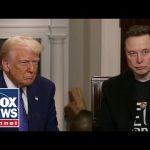Elon Musk’s latest initiative, the so-called D.O.G.E. ultimatum, has thrown the federal workforce into chaos, sparking heated debates about accountability, efficiency, and the limits of executive authority. Over the weekend, Musk, acting as head of the Department of Government Efficiency (DOGE) under President Donald Trump’s administration, issued a directive requiring federal employees to list five accomplishments from the past week or risk being considered resigned from their positions. The move has drawn both praise and condemnation, highlighting deep divisions over how government operations should be managed.
Musk’s ultimatum reflects his signature disruptive style, reminiscent of his approach to corporate management at Tesla and SpaceX. Supporters argue that this level of accountability is long overdue in a federal bureaucracy often criticized for inefficiency and waste. President Trump has enthusiastically endorsed the initiative, calling it “ingenious” and claiming it will expose fraud and inefficiency within the government. Polls indicate that a significant portion of Americans support Musk’s push for transparency, with many seeing it as a necessary step to ensure taxpayer dollars are well spent.
However, the rollout of Musk’s directive has been anything but smooth. Conflicting guidance from agencies and the Office of Personnel Management (OPM) left many federal employees confused about whether compliance was mandatory. Some departments, like the State Department and Department of Defense, instructed employees not to respond due to concerns about national security and privacy. Meanwhile, other agencies encouraged participation, creating a patchwork of responses that undermined any semblance of uniformity. Legal experts and unions have also raised questions about whether Musk has the authority to enforce such demands or interpret silence as resignation.
Critics argue that Musk’s heavy-handed approach is emblematic of broader issues within the Trump administration’s governance style. Democrats and labor unions have condemned the ultimatum as an abuse of power that disregards federal employment laws and undermines worker morale. Even some Republicans have expressed unease over Musk’s growing influence in government decision-making, with concerns about his lack of accountability and potential overreach. The chaos surrounding this initiative has led to lawsuits from unions and watchdog groups challenging its legality.
Despite the backlash, Musk remains undeterred. He has doubled down on his demands, warning that non-compliance will lead to terminations in subsequent rounds of evaluations. This aggressive stance underscores his commitment to reshaping government operations in line with private-sector efficiency models—a vision shared by Trump but fraught with legal and logistical challenges. Whether this experiment will lead to meaningful reform or further erode trust in public institutions remains to be seen.
The D.O.G.E. ultimatum is shaping up to be a pivotal moment for federal governance under Trump’s administration. While it has sparked important conversations about accountability and efficiency in government, it has also exposed deep flaws in its execution and raised serious questions about executive overreach. As lawsuits mount and agency leaders push back, the outcome of Musk’s initiative could set a precedent for how far private-sector practices can—or should—be applied to public service.




